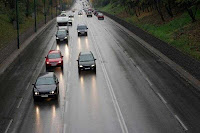OK, so the seasons are going to change. We can’t stop that. However, it’s not a bad idea to do something
about your brakes so you can’t count on stopping during winter.
Before we even talk about the brakes themselves, let’s
make sure the brake fluid is at the proper levels. Your brake fluid is the stuff that is
actually moving the pistons around to apply pressure and make your brakes work. Fluids will move slowly in the winter, and if
the levels are off, that can add up to a number of problems. The brakes themselves may be fine, but if the
brake fluid is leaking, low, or just not there… you will definitely have some
challenges.
Another consideration are the shoes. No… not the brake shoes, but your shoes. Believe it or not, many accidents occur each
year because people have on wet, slippery shoes. Their feet slide off the edge, and there just
isn’t time to recover. So… dry your
shoes.
And, of course, know what type of brakes you
have. If they are standard brakes,
you’ll need to pump them slightly on slippery roads. If you have an anti-lock brakes (ABS), the
brakes will do the pumping for you. Just
apply as normal, and always keep eye contact with the road.
Yes, your brakes are important… but the other things
around the brakes are just as vital.
Stay safe!








